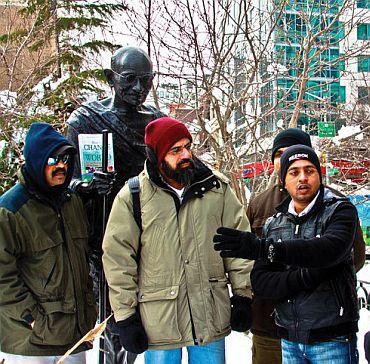 New York's Union Square Park saw a rather unusual protest gathering near the statue of the Mahatma in January. There was neither slogan-shouting nor posturing when a small group of about 15 Indians scrunched their way unsteadily through the piled snow to make a quiet stand against corruption in India.
New York's Union Square Park saw a rather unusual protest gathering near the statue of the Mahatma in January. There was neither slogan-shouting nor posturing when a small group of about 15 Indians scrunched their way unsteadily through the piled snow to make a quiet stand against corruption in India.
The discussion was civil, most of it mature and nuanced, some of it a little more passionate.
The protest, organised by Atul Kumar, on January 30 was a result of a social media effort driven by Indians Against Corruption, a Delhi-based non-governmental organization, as part of general public disgust at the venality of the Indian bureaucracy, articulated most recently in the scandal over the distribution of 2G spectrum to private telecommunication service providing companies. Kumar and the others present agreed that corruption is entrenched in the Indian system. Kumar recalled that during his student days at the Indian Institute of Management, he was stuck with the nickname 'Ghotala' (scam) only because he came from corruption-ridden Bihar. Ashamed of the bad reputation his state has gained, Kumar asked other IIM alumni to help organise protests in the US.
Kumar recalled that during his student days at the Indian Institute of Management, he was stuck with the nickname 'Ghotala' (scam) only because he came from corruption-ridden Bihar. Ashamed of the bad reputation his state has gained, Kumar asked other IIM alumni to help organise protests in the US.
'You choose to leave the battlefield, move to a foreign country and now suddenly you start feeling this guilt,' one of the recipients wrote back, arguing that if Kumar
But soon others, like his friend Satish Prasad, stepped to the plate.
'If the non-Indians are made aware of the true colors of the Indian ruling establishment,' Prasad wrote to Kumar, 'and if they start treating Indian politicians and bureaucrats as they treat most rich despots then maybe our ruling classes will get goaded into some action.'
The protesters walked over from the Gandhi statue to Union Square Park, where they discussed India's struggle with corruption.
"What I am proud about is that all people have come on a single platform. It was planned in a few cities, but people have come forward everywhere,' said Kapil Bolisetti, who outside his day job is an activist for India's Lok Satta political party.
While calling for more accountability, Kunal Khosla of New Jersey felt that the culture of corruption in India is encouraged by a complacent and often complicit media.
Protester Ashok Nagrath argued that technology, such as in the form of the proposed biometric unique identity cards, would help dramatically reduce fraud in the system and increase accountability.
Bihar Chief Minister Nitish Kumar has won plaudits within India and abroad for signs of improvement in the state, which is one of India's most backward, poor and corruption-ridden states.
Bolisetti cautioned that if Kumar "goes away tomorrow, we don't want another (former Bihar chief minister) Lalu Prasad Yadav. If we want to go there, we want to have check balances in the system itself."





